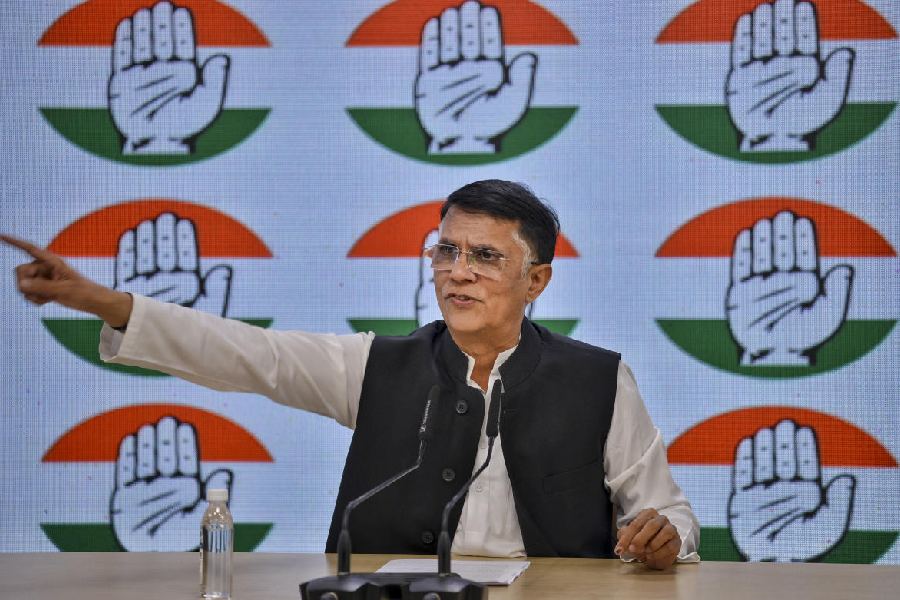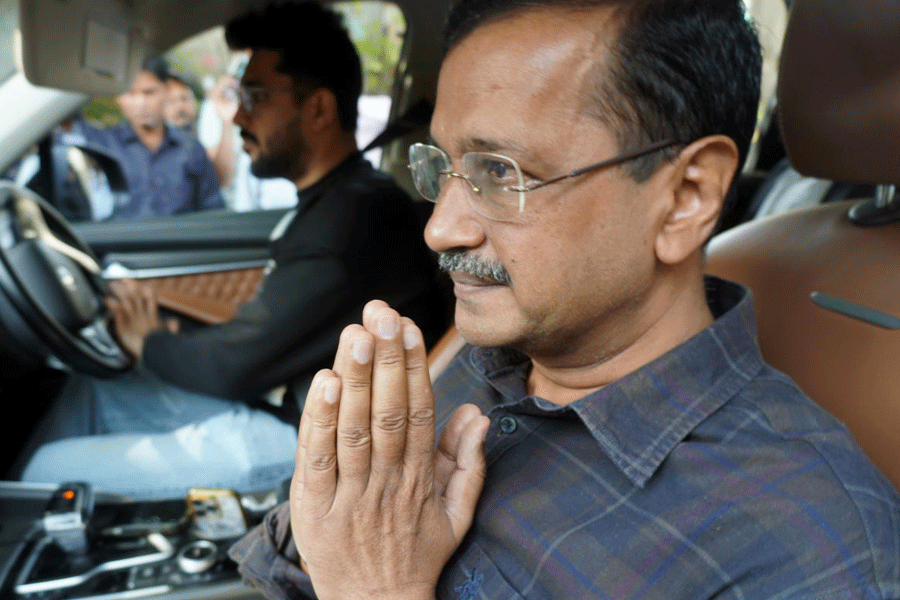 |
| Illustration: AshokeMullick |
If Ashwani Kumar was not a member of the Prime Minister’s council of ministers — and not seen as a Manmohan Singh groupie — wouldn’t he have socked the Planning Commission for recommending its contentious caps on poverty levels in India? Like the way his party, the Congress, did?
Kumar smiles enigmatically. The junior minister of planning is proper — even reticent — when drawn on thorny issues. Yet, as a Congressman, he felt unshackled enough to inform the Prime Minister in writing that the government’s image suffered when senior minister Kapil Sibal claimed there was “zero loss” to the exchequer from the 2G spectrum allocation.
Blame the shift from being a Congress spokesperson to an officeholder housed in the interiors of the venerable Yojana Bhavan which seats the Planning Commission in Lutyens’s Delhi. In his roomy but minimally furnished office — the only distraction is an exotic Kashmiri rug — I remind Kumar, who is also minister for science and technology and earth sciences, about his missive on Sibal.
“It is true that both as an MP and a minister I have taken the liberty of expressing my views for the consideration of our top leadership because I do believe it is not only one’s right to do so, but an obligation to honestly express views on national problems and issues,” he explains.
So how does he honestly view the Planning Commission’s affidavit filed on September 19 in the Supreme Court that limited poverty line estimates to a lowly Rs 26 a day for people in rural areas and Rs 32 a day for those in urban areas? Apart from getting the backs of the Opposition and food rights campaigners up, the commission’s figures — based on the proposals of a committee headed by the late economist Suresh Tendulkar — were contested by two of its members, Mihir Shah and Abhijit Sen.
“These estimates are based on certain criteria derived by people who have been experts in their field. However, it is true that with rising aspirations and rising costs, there is a popular perception that the consumption expenditure per capita for determining poverty lines is not realistic and results in an unfair exclusion of the deserving beneficiaries of the government’s flagship anti-poverty programmes,” says the 59-year-old minister.
He adds that conversely it is also true that “there are reports of the non-deserving having been included in BPL (below poverty line) surveys and the truly poor having been left out.” For this skewed assessment, he blames the “flawed implementation of methodology” adopted by the rural development ministry that is responsible for carrying out BPL surveys in the states.
What then is the answer? “We need to revisit and relook the entire gamut of poverty. I do not believe that in an issue as sensitive as this, any methodology can be cast in stone,” says Kumar.
I ask if he was involved in drafting the affidavit and was, therefore, in a position to avert the controversy. “I have been involved in drafting this. In April and September this year, I had observed that concerns were expressed by the Supreme Court in its interim observations and those had to be honoured. I did not have the occasion to see it (the affidavit), perhaps because I was travelling abroad,” he recalls.
By the time he returned, the document had ignited a debate. Kumar has his own take on the complex issue of fixing poverty line caps. “Poverty is not just about eating. It should be determined in the context of rising aspirations, clothes, sanitation, education and housing. Indeed, rising aspirations are redefining ways of looking at the rich and the poor,” he says.
In the Congress, Kumar is regarded a trifle unfairly as “aloof” and even a “snob”. These were labels that led his detractors in 24 Akbar Road — the Congress headquarters — to conclude he was also “apolitical” because no politician worth his Gandhi topi could alienate himself from the masses. That he debuted in parliamentary politics in 2002 through the Rajya Sabha and not the Lok Sabha fostered the view.
Kumar challenges it with the assertion that he is a “grassroots” and not an “armchair” politician. If he didn’t contest the last Lok Sabha election, it was because the “high command” had decided that no Rajya Sabha member would. But there’s no doubting his Congress-embedded pedigree. His father, Prabodh Chandra, whom he describes as Jawaharlal Nehru’s “acolyte”, was the Speaker of the legislature of undivided Punjab and an MP from Gurdaspur for 40 years. Indira Gandhi appointed Kumar a joint secretary of the Gurdaspur Congress committee in 1976. Rajiv Gandhi gave him a huge fillip by making him an organising secretary of the Punjab Congress in 1986 and then electing him as an All India Congress Committee member in 1991 from Punjab. Sonia Gandhi inducted him in the party’s media committee and the economic policy introspection committee. The long and the short of the brief resume is Kumar has the “loyalist” epithet embossed on his heart and mind.
It was this that prompted him to follow Arjun Singh and N.D. Tiwari when they split ranks with Sitaram Kesri — seen by most Congressmen as a pretender — in 1995. He returned to the Congress only when Sonia took over the party.
Perhaps, part of the reason Congressmen nurture ambivalent notions about Kumar is that, unlike many of his compatriots, politics was not his first calling. He graduated from Delhi’s St Stephen’s College, got a masters degree in law from Delhi University and did an MPhil on the legal control of international terrorism at Jawaharlal Nehru University (JNU). By his admission, the North Campus — housing St Stephen’s and the university — as well as JNU, had experienced the “highpoints of Leftist ideology” in his academic years. “Che Guevara was the poster boy,” he remembers.
Yet he was uninfluenced by the Left ideas because “my single-minded devotion was to become a lawyer”. At JNU, he found the “atmosphere conducive to serious work” but he stayed away from the “robust” student action. Indeed, he had already begun practising law.
Therefore, while Arun Jaitley — then a committed activist of the RSS’s student front, the Akhil Bharatiya Vidyarthi Parishad — was a contemporary, Kumar says he was clear if he was to be in politics, it had to be in the Congress. Once Indira Gandhi had zeroed in on the 23-year-old lawyer, his political path had been charted out. “My politics is commitment to public service and loyalty to the nation, the party’s ideology and its leadership,” he declares.
Between pursuing his legal calling and considering politics, Kumar made time for something one wouldn’t associate with a stylish and mannered politico like him. That was wrestling. “I started practising the sport at school (Delhi Public School) and I was the first wrestler of St Stephen’s. I won the inter-college wrestling competition. I was very strong in my body; the only problem was I didn’t know the techniques,” he reveals.
Having served two generations of the Gandhis, does he foresee the chance of working under Rahul Gandhi in the near future? Like a quintessential Congresswallah, he doesn’t get into knotty questions on when the Gandhi scion will pick up the baton of leadership. “I sincerely hope that Rahul assumes larger responsibilities. His heart is in the right place and I believe his campaigns for the farmers, tribals and the poor have created the requisite resonances in the country,” says Kumar.
He acknowledges that through the crises that beset the Congress and the Centre over the past few months, Sonia’s absence was missed when she was away for medical treatment. “Sonia Gandhi’s presence is a source of comfort and guidance to the party and government. It’s her leadership that has shown the way at every step,” says Kumar.
Why didn’t the four-member panel she had set up to function in her absence take off, considering Rahul was in it? “You don’t expect me to comment on it, do you? The committee by its nature was ad hoc,” he retorts.
Does he believe that the Congress and the government will snap out of the miasma of scams and allegations? “I am deeply distressed for both, when the top leadership, known for the highest standards of rectitude and probity in public life, is being pilloried in the manner in which it is being done,” he says. He doesn’t want to crystal gaze but his statements suggest his outlook isn’t too cheery.
“We know the Opposition has the privilege of opposing the government with all the ammunition it may have. Yet I had hoped that a certain ‘Lakshman rekha’ would be observed at least by senior Opposition members so that parliamentary democracy doesn’t become dysfunctional. The idiom of political discourse, as reflected in the utterly distasteful statements of senior BJP leaders, will only sharpen the political divide. It remains a challenge for the political establishment to resurrect a constructive political dialogue conducive for a wide political consensus on key national issues,” says Kumar.
As his government singes its fingers with one hot potato after another, Kumar signals that for him it’s work as usual. He’s currently trying to spark a discourse on whether some of the UPA’s hobbyhorses like ushering in the UID regime and the DNA profiling bill will “encroach on citizens’ privacy rights” and has set up a high-powered panel to examine these.
To those in the Congress who are convinced that Kumar is a Manmohan Singh groupie, this is probably his way of saying, No, I am not quite one.











